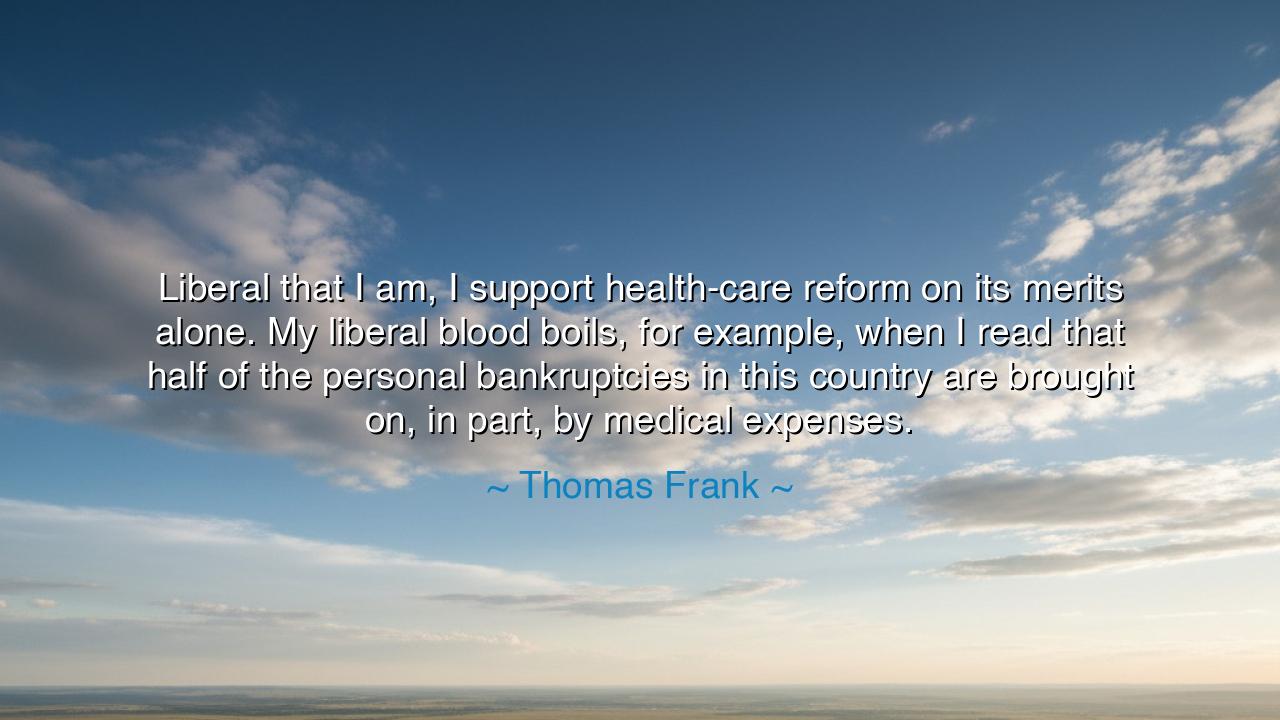
Liberal that I am, I support health-care reform on its merits
Liberal that I am, I support health-care reform on its merits alone. My liberal blood boils, for example, when I read that half of the personal bankruptcies in this country are brought on, in part, by medical expenses.






In the words of Thomas Frank, a writer of conscience and critic of injustice, there burns the fire of moral conviction: “Liberal that I am, I support health-care reform on its merits alone. My liberal blood boils, for example, when I read that half of the personal bankruptcies in this country are brought on, in part, by medical expenses.” Though his tone is measured, beneath it beats the fury of a soul that cannot accept a world where sickness leads to ruin, and where the healing arts — meant to preserve life — have become instruments of debt and despair. His words are both lament and call to arms, born from the deep belief that compassion, not profit, should govern the treatment of the weak and the ill.
The origin of this quote lies in the American struggle for health-care reform, a battle that has spanned generations and presidents, marked by debate, division, and the clashing of values. Thomas Frank, long known for exposing the contradictions between wealth and justice, wrote these words in the midst of that struggle, when stories of families driven to bankruptcy by medical bills filled the nation’s conscience. He speaks as one whose political philosophy — liberalism — is not rooted in mere ideology, but in empathy. His “liberal blood” does not boil for party or position, but for people — for the countless citizens who labor all their lives only to be undone by a single misfortune of the body.
To understand his anger is to recognize the moral wound that such injustice represents. For what does it say of a civilization when healing becomes a privilege rather than a right? When hospitals become fortresses guarded by the price of entry? In ancient times, even in societies far less advanced than ours, the healer’s duty was sacred — a divine charge, not a transaction. The physician of old, guided by the oath of Hippocrates, swore to aid the suffering without greed. Yet in our age of machines and corporations, that oath has been twisted into policy and profit, and the patient — the fragile human being — has too often become the victim of commerce. It is this betrayal of humanity that Frank’s words denounce.
Consider a story that might have moved his pen — that of Elizabeth Warren, before she became a senator, when she studied bankruptcy law. She discovered that most families who went bankrupt were not reckless spenders or gamblers, but ordinary, hardworking people whose lives were shattered by illness. A father’s heart attack, a child’s leukemia, a mother’s surgery — these were the sparks that ignited the fire of financial ruin. The tragedy was not only physical, but moral: that a system designed to save lives could also destroy them. Such truths make the blood boil of any who still possess a conscience.
But Thomas Frank’s words are not born only of rage; they are born of hope. When he says he supports reform “on its merits alone,” he reminds us that true virtue needs no partisan disguise. Compassion does not belong to the left or the right — it belongs to the human heart. To see suffering and wish to relieve it is the oldest and noblest instinct of humankind. Frank’s call, therefore, is not to political loyalty but to moral clarity: that we must build systems that heal rather than harm, that lift rather than crush, that remember the soul within every statistic.
There is also wisdom in his phrase, “liberal blood boils.” For this is not the cold anger of cynicism, but the righteous anger of the empathetic — the same fire that moved the prophets of old to cry against injustice, and the reformers of every age to fight for the downtrodden. There is no shame in such fury; it is the pulse of conscience. Just as the physician’s art begins with the diagnosis of pain, so too does justice begin with the recognition of suffering. When Frank’s blood boils, it is because his heart still beats for others — a sign that his spirit, though weary of politics, has not grown numb to humanity.
So, my children, take this lesson into your own hearts: let your blood boil for what is right, but temper that fire with wisdom. Do not let the world’s indifference make you cold, nor its complexity make you silent. Remember that every law, every system, every reform must serve the living — not the ledger. When you hear of suffering, do not look away. When you see injustice, do not excuse it as inevitable. Speak, act, and care — for silence, too, can wound.
And as Thomas Frank teaches, let your ideals not be of party but of principle. To care for the sick, to protect the weak, to ensure that no family is destroyed by misfortune — these are not the dreams of one ideology, but the duties of all mankind. For a society that abandons its vulnerable is not civilized, and a heart that grows numb to suffering is not free. Let compassion be your law, and justice your practice — and then, even amid imperfection, you will have honored the truest spirit of humanity.






AAdministratorAdministrator
Welcome, honored guests. Please leave a comment, we will respond soon